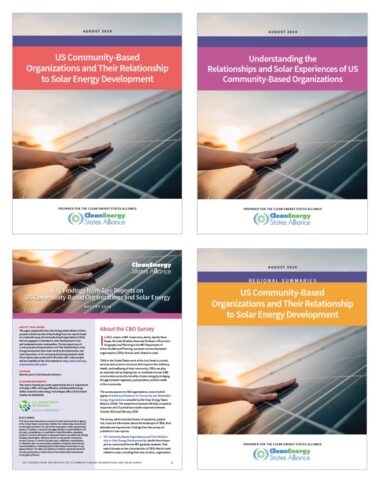Resource Archive - Report
SEARCH RESOURCES
You can also search by author name.
RESOURCE TYPES
RESOURCE TOPICS
RESOURCE PROJECTS
RESOURCE YEARS
This report compiles research on best practices for designing solar programs that provide meaningful benefits to low-and-moderate income households. The report examines different types of solar projects, including residential-serving community solar, rooftop solar, and installations serving multifamily affordable housing. It includes six case studies and information about savings verification.
This issue brief, released by Clean Energy Group and CESA, outlines best practices and lessons learned for state policymakers and regulators engaged in developing energy storage peak demand reduction programs. The brief explores key elements of program design, such as incentive mechanisms and dispatch methods, as well as considerations for incentivizing load reduction versus power export, and peak demand reduction versus emission reduction.
This report from CESA and Sandia National Labs compiles the results of independent research, providing a summary of emerging affordability and accessibility approaches in leading state energy storage programs. It is intended as a reference material that can be used in state energy storage policymaking across diverse geographical and regulatory jurisdictions.
This paper presents recommendations to help state energy agencies design and implement equitable stakeholder engagement strategies for their solar programs.
This case study explores the Tribal-State relationship through the experiences of the Leech Lake Band of Ojibwe, which shares geography with Minnesota. Over the past decade, the Band has built relationships with state agencies in support of renewable energy and sustainability programs.
This document seeks to help state government officials create and/or expand their processes for equitably engaging with communities when developing and deploying solar programs.
This document, part of CESA’s IRA Explainers and Guides Series for States, answers questions about the Build America, Buy America (BABA) Act and the domestic content bonus tax credit program requirements for awardees of the Greenhouse Gas Reduction Fund Solar for All program. It will be useful to other stakeholders as well to understand how BABA will apply to Solar for All and the differences between BABA and the tax credit requirements.
CESA has released a series of reports based on the findings of a nationwide survey of community-based organizations (CBOs). The survey, which included dozens of questions, yielded rich, nuanced information about the landscape of CBOs, their attitudes and experiences.
This report is a series of case studies highlighting the four winners of the 2024 State Leadership in Clean Energy Awards.
Washington, DC’s Solar for All program aims to benefit over 100,000 households with incomes at or below 80% of area median income. This case study profiles the program and the ways its administrators have handled outreach and consumer education over the program’s seven-year history.










